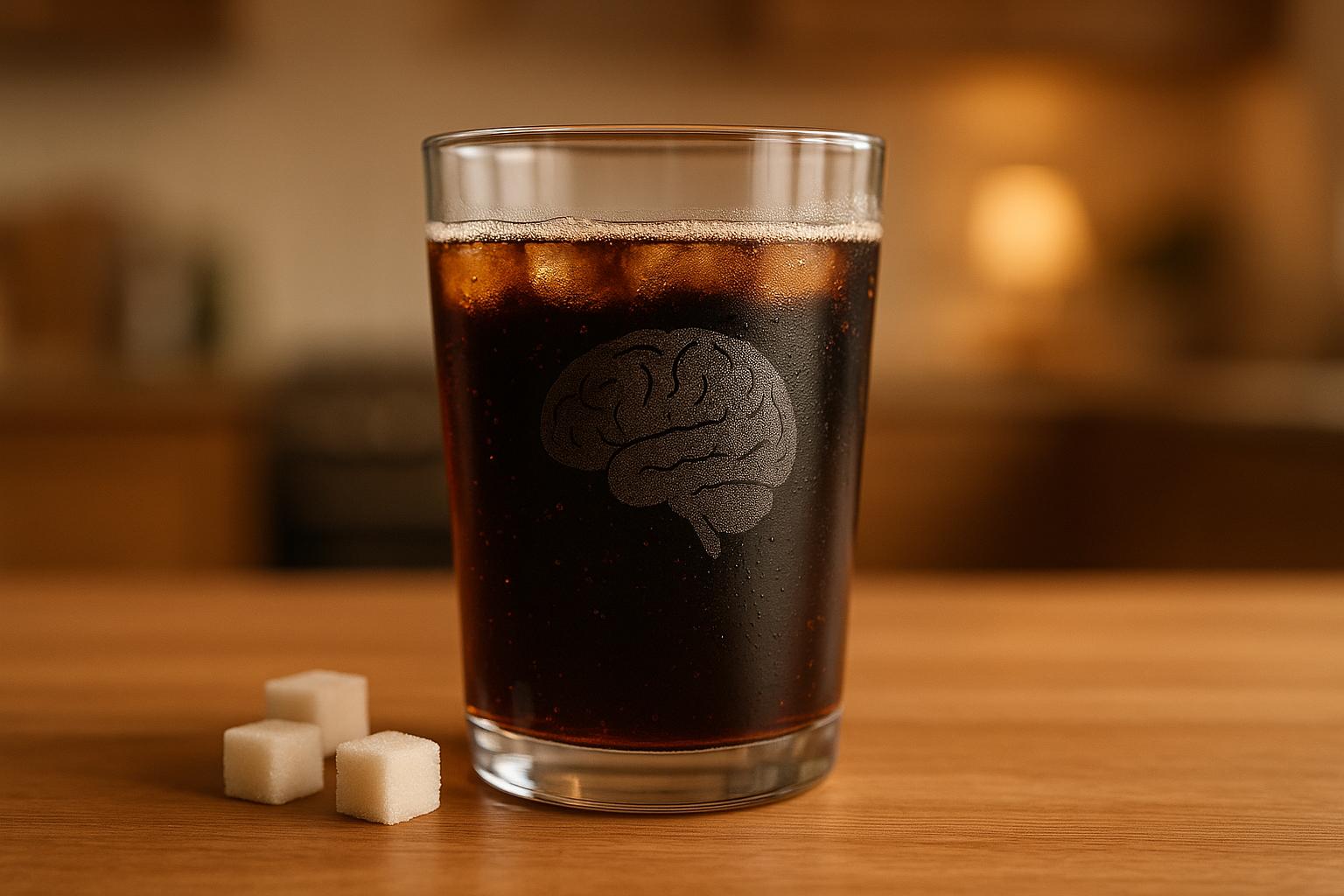Consuming sugary soft drinks may do more than harm your waistline – it could also disrupt your mental health. A recent study by Sharmili Edwin Thanarajah and her team reveals that regular intake of sugar-laden beverages like sodas and energy drinks can alter gut bacteria, triggering inflammation and affecting the gut-brain connection. This disruption is linked to mood changes, anxiety, and depression. Women, in particular, experience more pronounced gut microbiome changes due to hormonal and immune system factors.
Key findings include:
- Gut health impact: High sugar intake reduces bacterial diversity and promotes inflammation.
- Mental health link: Poor gut balance may interfere with neurotransmitters like serotonin, affecting mood.
- Gender differences: Women show greater gut microbiome changes compared to men.
To combat these effects:
- Cut back on soft drinks gradually.
- Add gut-friendly foods like fiber, fermented products, and omega-3s to your diet.
- Opt for healthier drink alternatives like fruit-infused sparkling water.
This research highlights how dietary choices influence both physical and mental health. Small changes, like reducing sugary drinks and improving gut health, can make a meaningful difference.
The Microbiome Gut-Brain Connection: Depression and Anxiety
How Soft Drinks Affect Gut Bacteria and Mental Health
Drinking soft drinks regularly can throw off the balance of your gut bacteria, which plays a key role in digestion and mental well-being. Here’s a closer look at how these beverages interfere with gut health and influence mood.
Sugary Drinks Disrupt Gut Balance
Your gut microbiome thrives on diversity, which is essential for maintaining overall health. When you consume too much sugar – like the kind found in soft drinks – it can upset this balance. The result? Inflammation and a decline in the beneficial bacteria that keep your gut functioning smoothly.
Inflammation and Gut-Brain Communication
When gut bacteria are out of balance, the body produces more cytokines, which are proteins that promote inflammation. This can disrupt the communication between your gut and brain, often referred to as the gut-brain axis. A compromised gut lining, or "leaky gut", allows inflammatory agents to enter the bloodstream, which may contribute to mental health issues like anxiety and depression.
Impact on Brain Chemicals and Mood
Gut bacteria are involved in creating neurotransmitters such as serotonin, dopamine, and GABA – chemicals that regulate mood and emotions. While scientists are still studying how soft drinks affect the production of these neurotransmitters, it’s likely that the imbalance caused by high sugar intake has a negative impact on mood and emotional well-being.
Study Results: Differences Between Women and Men
Gut Bacteria Changes in Women vs. Men
Research led by Sharmili Edwin Thanarajah and her team revealed that soft drink consumption affects gut bacteria differently in women compared to men. Specifically, women who consumed large amounts of soft drinks experienced a decrease in bacterial diversity in their gut – a change that wasn’t seen in men. The study also identified differences in markers related to gut inflammation and digestive function between the sexes, hinting at unique biological responses.
Hormones and the Immune System
In women, hormonal fluctuations can impact sugar metabolism and the composition of the gut microbiome. Additionally, variations in immune responses may lead to stronger inflammatory reactions. These factors likely contribute to the more pronounced changes in gut bacteria observed in women, which could also influence mental health. This highlights how biological differences between genders can shape the gut-brain connection and its effects on mental well-being.
sbb-itb-ed556b0
Ways to Cut Soft Drink Intake and Improve Gut Health
If you’re looking to reduce gut inflammation and boost your overall health, here are some practical strategies to get started.
How to Drink Fewer Soft Drinks
Switching to healthier alternatives can make a big difference. For example, replace your daily soda with sparkling water flavored with fresh fruit slices or a splash of 100% fruit juice. This way, you can still enjoy the fizz without the excess sugar.
Take it slow for lasting results. Gradually cut back on soft drinks by reducing your intake one drink at a time – say, one less soda each week – until you hit your goal. Tracking your progress can help keep you motivated.
There’s also a financial upside to cutting back on soda. The money you save could be spent on healthier options like herbal teas, coconut water, or even investing in a good water filtration system for your home.
Diet Changes for Better Gut Health
Your gut thrives on the right foods, and making small changes to your diet can have a big impact.
- Add more fiber: Foods rich in fiber nourish your gut bacteria, improving digestion and even helping regulate your mood. Aim for 25–35 grams of fiber daily by including whole grains, legumes, fruits, and vegetables. Beans, lentils, and chickpeas are particularly great for encouraging beneficial gut bacteria.
- Try fermented foods: Probiotic-rich options like yogurt with live cultures, kefir, kimchi, sauerkraut, or kombucha can introduce good bacteria into your system. Start with small servings – 2 to 4 ounces a day – to give your gut time to adjust comfortably.
- Incorporate omega-3s: Foods like salmon, walnuts, and flaxseeds are rich in omega-3 fatty acids, which can reduce gut inflammation and improve communication between your gut and brain. Adding these to your meals a few times a week may enhance your overall well-being.
- Focus on polyphenol-rich foods: Antioxidant-packed options like blueberries, dark chocolate (70% cacao or higher), green tea, and colorful vegetables help beneficial bacteria flourish. These foods may also support mood regulation.
These dietary changes can go a long way in supporting gut health and complement other wellness strategies.
Portland Chiropractic Group‘s Wellness Support

At Portland Chiropractic Group, wellness goes beyond spinal care. Dr. Brett Weaver and his team understand that true health requires a broader approach, addressing factors like nutrition, movement, and lifestyle habits that affect both physical and mental well-being.
The practice offers personalized care plans that integrate nutritional advice with chiropractic treatments. During consultations, patients receive tailored recommendations for reducing inflammatory foods and improving their overall diet to support spinal health and wellness.
In addition to chiropractic adjustments, the clinic provides evidence-based treatments like the Graston technique, dry needling, and shockwave therapy – all delivered in a transparent and patient-focused environment.
To complement these treatments, functional training services are also available. These help patients develop healthier movement patterns, which work hand-in-hand with dietary improvements to enhance the gut-brain connection and promote mental well-being. By addressing these interconnected aspects of health, Portland Chiropractic Group supports a holistic path to feeling your best.
Conclusion: The Truth About Sweet Drinks and Health
Research led by Sharmili Edwin Thanarajah and colleagues has highlighted a concerning link between frequent soft drink consumption and disruptions in gut health. These sugary beverages can throw gut bacteria off balance and trigger inflammatory responses, which may interfere with gut–brain communication and even affect mood.
Interestingly, the study also uncovered gender-specific differences, suggesting that hormonal and immune system factors might play a role in how these effects manifest. This research opens the door to straightforward lifestyle adjustments that can promote better gut and mental health.
The takeaway? Cut back on soft drinks and consider healthier options like fruit-infused sparkling water. Pair this with a diet rich in fiber, fermented foods, and omega-3s to give your gut the support it needs.
These findings also emphasize the importance of a well-rounded approach to wellness. Maintaining a healthy gut is closely tied to mental well-being. At Portland Chiropractic Group, Dr. Brett Weaver and his team understand that true wellness goes beyond spinal care. Their patient-focused, evidence-driven methods include lifestyle guidance to complement chiropractic treatments, helping you achieve a healthier, more balanced life.
FAQs
How do sugary soft drinks affect gut health, and what does this mean for mental well-being?
Sugary soft drinks can throw off the delicate balance of bacteria in your gut, encouraging the growth of strains like Eggerthella, which have been associated with depression. This imbalance can lead to inflammation and disrupt neurotransmitter production – both of which play a crucial role in maintaining mental health.
This highlights how what you eat can directly influence your brain through the gut, potentially increasing the risk of depressive symptoms. Cutting back on soft drinks and focusing on a balanced diet that supports gut health could be a step toward improving mental well-being.
Why do women experience more pronounced gut microbiota changes from drinking sugary beverages compared to men?
Women tend to experience more pronounced shifts in their gut microbiota from consuming sugary drinks. This is partly due to higher levels of Eggerthella – a type of bacteria linked to depression – and a more noticeable drop in microbiome diversity. Hormonal differences between men and women also play a role, potentially making women more susceptible to diet-related changes in their gut composition.
These findings underscore the need for a balanced diet to promote gut health and mental well-being, especially for women who may be more affected by these dietary impacts.
How can I cut back on soft drinks and support my gut health?
Reducing your intake of soft drinks while boosting gut health doesn’t have to be complicated. Start by gradually swapping out sugary drinks for healthier options like water, sparkling water, or unsweetened herbal teas. Not only do these alternatives cut down on sugar, but they also help maintain a balanced gut microbiome.
Another step is adding more fiber-rich foods to your meals. Think fruits, vegetables, and whole grains – they’re great for encouraging the growth of healthy gut bacteria. Staying hydrated is equally important, as it helps with digestion and supports the gut’s natural barrier. Also, be mindful of artificial sweeteners, often found in diet sodas, as they can sometimes interfere with gut health.
With these small changes, you can support your gut and reduce the potential mental health effects linked to sugary drinks.
Related Blog Posts
- Guide to Workplace Nutrition Education
- Neurobiological basis of chiropractic manipulative treatment of the spine in the care of major depression
- Association between physical activity and risk of depression: A systematic review and meta-analysis
- Ultraprocessed or minimally processed diets following healthy dietary guidelines on weight and cardiometabolic health: a randomized, crossover trial



Comments are closed